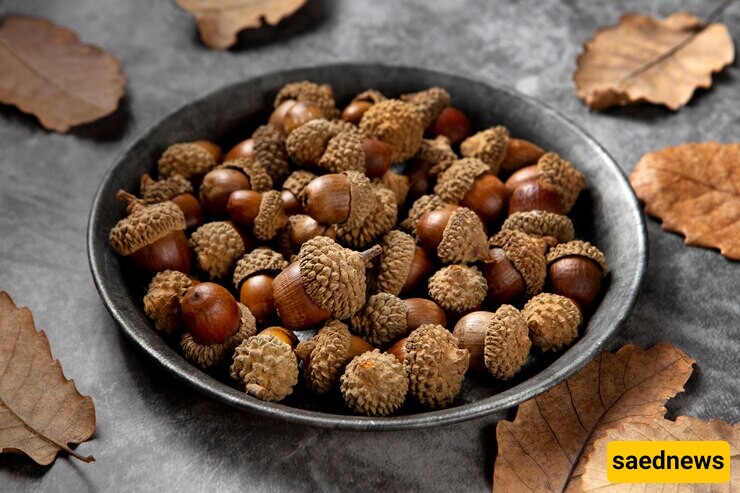SAEDNEWS: The fruit of the oak tree (Acorns or Oak fruit in English) is essentially the nut or fruit of the oak tree, appearing as a cylindrical hazelnut-like shape. It has a hard shell and a cap at the top that connects it to the tree. Acorns contain high levels of vitamins and minerals that contribute to heart health.

According to SAEDNEWS, The oak tree is highly beneficial and, with sufficient water, space, and nutrients, can grow significantly and have a long lifespan. Its leaves are dark green, extending to the base of the stem. The male flowers grow in hanging clusters, while the female flowers grow on long stalks emerging from the leaf axils.
Oak trees are found in many parts of the world, but few people consume their fruits today. You might wonder if acorns are edible. Yes, they are, but you cannot eat them directly from the tree. Some preparation and processing are required to make them suitable for human consumption because acorns contain high amounts of tannins, giving them a bitter and unpleasant taste.

Poisoning: Overconsumption of raw acorns, due to their high tannin content, can cause nausea, stomach discomfort, and kidney problems.
Pregnant and Breastfeeding Women: Since there are no precise studies on the effects of acorns during pregnancy and breastfeeding, it is recommended that pregnant and breastfeeding women avoid consuming them.
Infants and Children: Experts advise that infants and children should avoid consuming acorns.
Acorns have a cold and dry nature. They are rich in:
Vitamin B1 (Thiamine)
Vitamin B2 (Riboflavin)
Vitamin B3 (Niacin)
Vitamin B5 (Pantothenic Acid)
Vitamin B6
Vitamin B9 (Folate)
Calcium
Copper
Magnesium
Manganese
Iron
Potassium
Zinc
Fiber
Protein
Acorns are 1 to 6 cm in length and 0.8 to 4 cm in width and serve as a primary food source for squirrels and people in North America and Korea. Interestingly, a mature oak tree can produce around 2,200 acorns per year.
Some common species of oak in Iran include:
Iranian Oak or Zagros Oak
Darmaso
Yuvul
Ouri
Belandmaso
Sefidmaso
Beneficial for individuals suffering from severe diarrhea and glandular inflammation.
Acorn coffee, made from ground acorns mixed with cocoa and sugar, is an effective remedy for diarrhea and strengthens the body.
Effective in treating tonsillitis, angina, impetigo, scabies, and hoarseness.
While slightly difficult to digest, once digested, it provides good nutritional value, prevents diarrhea, and reduces stomach and chest bleeding.
Acorn flour can help prevent uterine discharge.
Effective against fainting and vomiting caused by stomach heaviness and beneficial for stomach ulcers, colic, and urinary dribbling.
The tannin in acorns facilitates protein digestion, helps regenerate body tissues, reduces excess moisture, prevents diarrhea, and controls bleeding.
Oak bark is used externally to wash inflammations, burns, hemorrhoids, and skin diseases. It also has disinfecting and wound-healing properties.
Acorns are also known for treating childhood bedwetting. Mixing acorns with frankincense and olive oil and giving it to children over several days is recommended.
Acorns are a healthy coffee alternative. To prepare an acorn beverage:
Peel the acorns and crush them finely.
Toast the crushed acorns in a pan over medium heat without oil.
Allow them to cool, then grind them into flour.
Store the flour in a tightly sealed container.
To prepare the drink, add one teaspoon of acorn flour to a cup of warm water, boil it, and add a teaspoon of cardamom powder.
For better taste, you can add a bit of milk. Tip: Soaking acorns in water a day before makes peeling easier and reduces bitterness.
While oak bark and leaves are less commonly used today, in the past, different parts of the oak tree were used to treat various ailments:
Oak bark and fruit were used to treat spleen and liver hypertrophy caused by alcohol abuse.
In children, acorns were used to treat and prevent rickets and scrofula.
Oak bark decoction was recommended for women suffering from vaginal discharge.
Oak was also historically used to reduce malaria symptoms, uterine prolapse, and hemorrhoids.
Excessive consumption of acorns reduces the body's ability to absorb iron due to their high tannin content.
They may interact with certain medications, and their saponins can irritate the stomach lining and cause acid reflux.
Pregnant and breastfeeding women should consume acorns only under medical supervision.
In summary, acorns, when properly prepared, offer numerous health benefits and can be a valuable addition to the diet. However, they must be consumed in moderation and with care, especially for specific groups like children and pregnant women.

